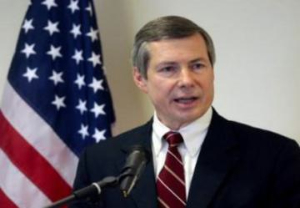CACI Analyst, March 3, 2015
CACI Analyst, March 4, 2015 (.pdf)
Contents
Analytical Articles
KAZAKHSTAN AND THE EEU, by Dmitry Shlapentokh
U.S. NEW SILK ROAD INITIATIVE NEEDS URGENT RENEWAL, by Richard Weitz
IS “TURKISH STREAM” A SERIOUS THREAT TO THE TRANS-CASPIAN PIPELINE?, by Juraj Beskid, Tomáš Baranec
CASA-1,000 – HIGH VOLTAGE IN CENTRAL ASIA, by Franz J. Marty
Field Reports
KYRGYZSTAN’S RESIGNED PROSECUTOR-GENERAL GIVES WORRYING PRESS CONFERENCE, by Arslan Sabyrbekov
MOSCOW PLEDGES TO COUNTERACT GEORGIA’S INTEGRATION WITH NATO, by Eka Janashia
ARMENIA TOUGHENS ITS STANCE AGAINST TURKEY, by Erik Davtyan
FOREIGN MINISTERS OF TURKEY, AZERBAIJAN AND TURKMENISTAN DISCUSS ENERGY AND TRANSPORTATION IN ASHGABAT, by Tavus Rejepova
U.S. New Silk Road Initiative Needs Urgent Renewal
By Richard Weitz (03/04/2015 issue of the CACI Analyst)
Despite the drawdown of U.S. military forces in Afghanistan, the withdrawal of U.S. forces from Central Asia, and a preoccupation with developments in East Asia and the Middle East, the Obama administration continues to affirm support for promoting the economic integration of South and Central Asia through its New Silk Road initiative. Launched soon after the administration assumed office, the policy seeks to promote regional trade and transit, improve customs and border flows, and deepen business and popular ties among these countries in order to promote peace and prosperity. But the administration must take urgent action to renew the project and achieve its worthy objectives.

Washington Misses the Point on Nagorno-Karabakh
By Stephen Blank (06/18/2014 issue of the CACI Analyst)
Presumably to fend off mounting criticism of U.S. policy, Ambassador James Warlick, the U.S. Representative to the Minsk Process on Nagorno-Karabakh, recently gave a series of speeches and interviews outlining U.S. policy on the Nagorno- Karabakh conflict. Warlick outlined U.S. support for the six principles that he said had already been agreed upon by all parties, and concluded that the main obstacle to resolving the conflict lay in the failure until now of the Armenian and Azerbaijani governments to make the hard decision for peace over domestic opposition. Warlick’s remarks reflect the Obama Administration’s failure to grasp what is at stake in the Caucasus or to take conflict resolution there sufficiently seriously.

“CACI Analyst, March 05, 2014”
Georgian PM Meets with U.S. President, VP, and Secretary of State
By Eka Janashia (the 03/05/2014 of the CACI Analyst)
Georgia's Prime Minister Irakli Gharibashvili met with U.S. President Barack Obama during his negotiations with Vice President Joe Biden at the White House on February 24. President Obama joined the meeting for about 20 minutes. The parties discussed the U.S.-Georgia strategic partnership, the prospects for Georgia’s integration with the EU and NATO, the necessity of continuing reforms in Georgia, as well as the perspective of closer U.S.-Georgia trade relations.
Georgia's Foreign Minister Maia Panjikidze said that the PM’s meeting with President Obama was pre-planned but not announced upon the request of White House. After the meeting, Gharibashvili said that “Georgia is moving actually to a new stage of relations with the United States.”
Both Obama’s readiness to meet with the Georgian PM and Garibashvili’s statements that the US is Georgia's “number one ally” can be taken to reflect recent developments in Ukraine.
President Obama and Vice President Biden praised Georgia for conducting its first peaceful, democratic transition of power, but also urged PM to cooperate with all of Georgia’s leaders and civil society to enhance the rule of law and consolidate Georgia’s democratic accomplishments.
U.S. Secretary of State John Kerry made the same points in a meeting with Gharibashvili on February 26: “We urge all Georgians to unite in looking forward and to leave the past in the past,” he said at the fourth plenary session of the U.S.-Georgia Strategic Partnership Commission.
Kerry stated that the bilateral “strategic partnership is stronger than ever” and proclaimed a plan to provide Georgia with "additional assistance" to help its European and Euro-Atlantic aspirations - specifically through visa-free travel with the EU - and to mitigate the heavy outcomes caused by the process of "borderization" in the occupied territories (see the 02/10/2013 issue of the CACI Analyst).
On February 25, at an event hosted by the Washington-based think-tank Atlantic Council, PM Gharibashvili said that six years ago at the NATO Summit in Bucharest, Georgia obtained the outstanding promise that it would become a member of the alliance. The pledge was reiterated at the 2012 Chicago summit when NATO underlined the importance of conducting free and fair parliamentary and presidential elections in Georgia. At the upcoming Summit in the UK in September, NATO should grant Georgia a Membership Action Plan (MAP) as a reward for fulfilling this task properly, Gharibashvili stressed.
He also called on the EU to open a membership perspective for the successful Eastern Partnership’s countries. “It is obvious that unless the European Union gives a clear promise of membership to the successful countries of the Eastern Partnership, crises similar to Ukraine will happen again and again,” he said. Gharibashvili then recalled that February 25 was the 93rd anniversary of the Bolshevik occupation of Tbilisi and urged that all efforts should be made to eschew such a tragedy in the 21st century.
The Georgian Dream ruling coalition as well as the opposition United National Movement party assessed the PM’s U.S. trip positively.
There are several reasons to assess Gharibashvili's U.S. visit positively, as it reflects a deepening institutionalization of the U.S. - Georgia Strategic Partnership. At the same time, U.S. statements make clear that reconciliation between Georgia's political forces and looking forward rather than dwelling on the past is essential to augment more political support from the U.S.
The U.S.-Georgia Strategic Partnership draws upon the charter signed by the two countries in January, 2009, to deal with the priority areas of democracy; defense and security; trade and economy; people-to-people and cultural exchanges. In 2012, then Georgian president Mikheil Saakashvili requested a U.S.-Georgia free trade agreement (FTA) and President Obama promised to explore the possibilities for such an agreement. At the recent meeting with the Georgian PM, the U.S. president suggested that the two countries should boost trade and deepen economic cooperation. In this context, the Georgian PM met with the U.S. Trade Representative Michael Froman to discuss the issue in detail.
However, the most important issue raised during the tour was that, given Ukraine’s’ ongoing tensions with Moscow, Washington might become more motivated to again raise the issue with other NATO members of granting Georgia a MAP. Meanwhile, the declaration of "additional assistance" for Georgia to smooth the progress of European integration also represents a tangible outcome of the visit.
On the other hand, the course of events in Ukraine may push Tbilisi to revise its normalization policy with Russia. Georgia's new government has never previously made such clear and principled statements on this issue as it did during the U.S. trip. In addition, Tbilisi was quick to welcome the formation of a new government in Ukraine and strongly condemned the developments taking place in Crimea. “The distribution of [Russian] passports, reinforcing military infrastructure and units by Russia on the territory of another state, as well as the decision to protect with armed forces the ‘interests of compatriots’ living in Ukraine, represent flagrant interference in the internal affairs of a sovereign state,” president Giorgi Margvelashvili’s statement reads.
Meanwhile, parliamentary speaker David Usuphashvili called on the international community not to allow a new conflict in Europe and apply all measures to avert a possible aggression.
On March 3, Georgia's Foreign Minister Maia Panjikidze had a telephone conversation with her acting Ukrainian counterpart, Andriy Deschytsya. They discussed the Crimean crises and agreed on the necessity of providing Georgia, Ukraine and Moldova an explicit perspective of EU membership.




